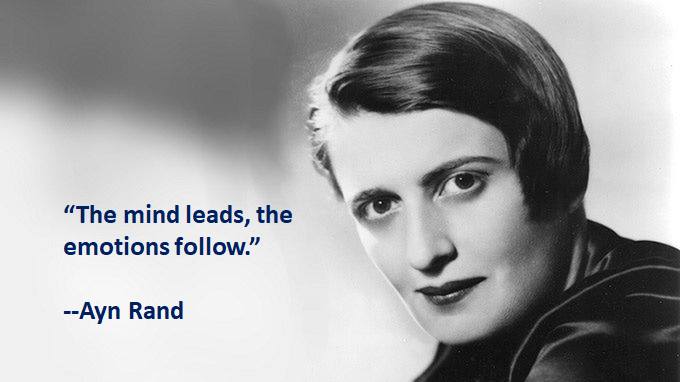5-Part Video Series on The Objectivist View on Emotions
As most–including Objectivists–do not clearly understand Rand’s views on emotions, I made these short videos. Each video is less than a minute.
There is a lot of misunderstanding of how emotions are treated in Objectivism. Rand has you programming–her word–your emotions. Through your “standard of value,” you set your emotions to respond the way you want: if you are happy or sad to life events. I was told this video is “spot on.” This is Pt 1 in this video series.
PT II in clarifying emotions in Objectivism. Programming your emotions is core to Objectivism. Your emotions could be ALL WRONG. You might naturally find pleasure in, say, doing drugs (i.e., “hedonism”). So you need to have the right values, such as valuing productivity, so that your emotions become a “lightning quick barometer” in your objective survival.
If we abide by “rational self interest,” what is “irrational” according to Ayn Rand? Family picnics. Driving hot rod cars. And muddy colors. Pt III: The Objectivist view on emotions
A view that some emotions are irrational (as opposed to “rational”) is toxic. It leads to cult like behavior: you’re under constant judgment on if what you think and feel is “rational” or not. People who knew Rand describe her collective as a cult, as Murray Rothbard did in his article The Sociology of the Ayn Rand Cult. And this fear of being judged for what you felt drove it. PT IV: Objectivist Views on Emotions.
PT V and final on Objectivist emotions: Objectivism creates toxic people. It’s an entire philosophy that tells you how to think, feel, and act. Like with communism, it’s not just “bad people.” The philosophy itself has systemic problems. It assumes you and your “whims” can’t be trusted and thus puts a civilizing ethics on a person. Rand seeks to mold people. This civilizing ethics is toxic. Hence my book, Towards Liberalism a Challenge to Objectivist Ethics.
The Inner World Matters. And Rand was no Psychologist
Why did I write this challenge to Objectivism? Because the inner world matters. We are not born tabula rasa. We do not need this civilizing ethics put on us. Our emotional mechanism is already designed well—as long as we respect it. Short video here.
What is the Objectivist Answer to the Following?
I raise and discuss these issues in Towards Liberalism that deal with emotions:
- Are the emotions you feel metaphysical (cannot be changed) or man-made (can be altered)?
- Is happiness a result of your achievements (secondary) or a mostly unalterable well inside you (primary)?
- What is reason’s role in life: to understand reality or an all-encompassing guide for every waking hour of one’s life?
- What role do emotions play in learning from life experience?
- What is the purpose of education: to transform a child into the rational ideal or put a child in touch with their authentic strength?
- How are women differentiated from men and what is their unique identity, value, and needs?
- On a scale of 1-10, how important is child rearing to human survival? On a scale of 1-10, how much emphasis is it given in formal Objectivist ethics?
As well as some implications that the answers have such:
- Who owns land: who got to it first, who fights for it, or based on some other moral paradigm?
- How can the environment be effectively sustained? Does it even matter?
- Do private citizens have the right to use firearms for self-defense?
